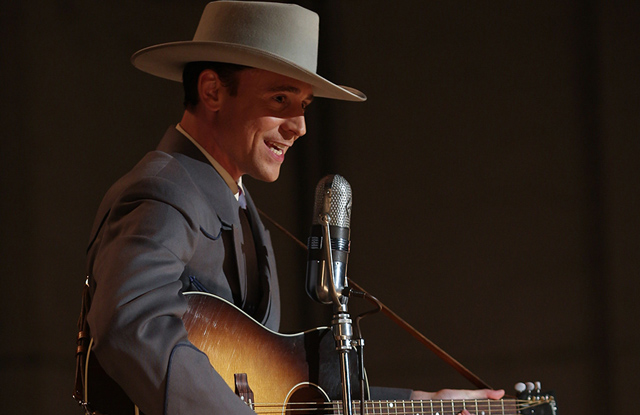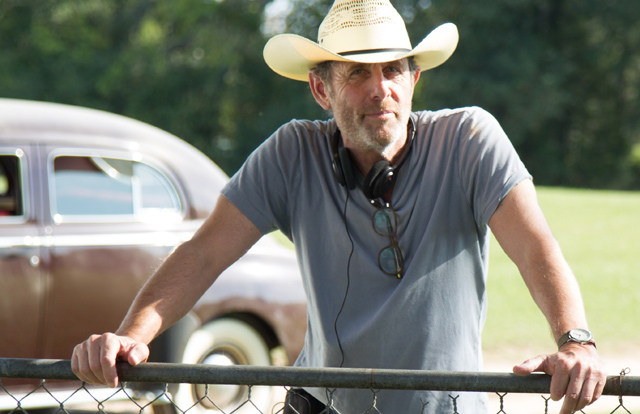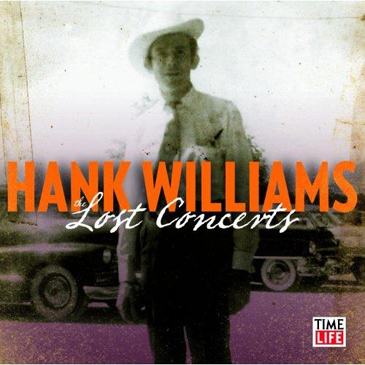CHICAGO – Patrick McDonald of HollywoodChicago.com audio review for the streaming series “Emily in Paris” the adventures of Emily Cooper and her fanciful/fashionable Paris friends and lovers, now in its fourth season. Episodes 1-5 currently on Netflix.
Interview: Tom Hiddleston, Director Marc Abraham on ‘I Saw the Light’
CHICAGO – The legacy of country music singer Hank Williams is embraced in every lonesome twang you hear in any song. The actor Tom Hiddleston (“Thor”) transcends his Loki roots to embody the 1950s songster in a way that is otherworldly, working from the script and direction of Marc Abraham.
Hank Williams was a bright wattage bulb that burned like a thousand suns, and was extinguished instantly at the tender age of 29. The influence of his short time within the country music scene, from about 1946 through to his death in 1953, was through the music chart statistic that Williams had an astounding 35 singles reach the country and western Top Ten (five after his death). His signature style and easy-going hit making continues to be heard in the heart of C&W (and all pop) music, and he can easily qualify as one of the Olympus-like gods of that particular brand of musical faith.

Tom Hiddleston as Hank Williams in ‘I Saw the Light’
Photo credit: Sony Pictures Classics
To become Hank Williams, the British-born actor Tom Hiddleston had to live in the skin of the singer, and spent five months encapsulating the life and interpreting it – including the singing – before one frame of film was shot. This allowed the script of director Marc Abrahams to be faithfully executed, and the result is a glimpse into another era, an influential music style and a passionate man.
HollywoodChicago.com talked to Tom Hiddleston and Marc Abraham – who also has had a long career as a Hollywood producer – on the day before the Chicago release of “I Saw the Light,” and the discussion, of course, centered on Hank.
HollywoodChicago.com: Marc, this is the first screenplay you’ve since your early TV days. What was it about the subject of Hank Williams that drove you forward to tell his story?
Marc Abraham: I love country music, having grown up in Louisville, Kentucky. I loved all the greats, including Hank. You can’t be a music fan without knowing something about Hank Williams. People tell me all the time they don’t ‘like’ country music, but I always counter if you like the Rolling Stones, or Neil Young, or Kurt Cobain, they all were influenced by country music.
What really provoked me was that about seven years ago, the idea of a Hank Williams movie was floating around, and this got my back up, because I thought if anyone does a Hank Williams movie, it ought to be me. Once I got that idea in my head, I just started writing the script. It would be about how it would appeal to me, and that’s how I originally got the impetus to go forward with it.
HollywoodChicago.com: Tom, you are a British man portraying a person from the American South. What do you understand more about the American South now that you’ve portrayed a country western icon?
Tom Hiddleston: Well, in a sense I think I do because I understand Hank. I feel like he’s a friend of mine in a way, because I spent five months thinking about him, trying to get inside his head and expressing his art. I spent time in Nashville, and in Shreveport [Louisiana], where we shot the film. We worked with a lot of local people who were kind, generous and non-judgemental. They understood what I was trying to do, and this generosity led me to the sense that the South is a very authentic place, with a lot of pride and a great sense of community.
HollywoodChicago.com: Marc, what is your theory on where Hank’s vibrant creative energy came from, meaning what sense of himself? What do think is the key to coming up with such great songs?
Abraham: I’ve very carefully tried to stay away from answering that question. I think the real answer is elusive – it’s so hard to express why an artist is great. Hank came from dirt poor Alabama, was raised by a single mother who had no musical background, so I think it’s a type of magic that is sometimes dusted on someone, and he also was a true poet. To me, Hank’s legacy is his literary legacy – what he had to say.
In country music, they always say it’s three chords and the truth, or a tear. It wasn’t about the guitar with Hank. He was a young boy without a father or guidance, who found a way to articulate a certain pain he had. What we endeavor to achieve in the film is to stay away from answering that question – not to try and understand the ‘why,’ but to show the experiences that he went through in his life, the acrimonious, passionate and high volume relationship he had with Audrey [his second wife], which obviously led to the inspiration to write those songs about the pain of love.

Director Marc Abraham on the Set of ‘I Saw the Light’
Photo credit: Sony Pictures Classics
HollywoodChicago.com: Tom, you also had to portray a man who was alive over 60 years ago, during a time in history that is completely different in social and historical context than now. Again, what was the key to being a 1940s and early 1950s man, and where did you find that key?
Hiddleston: I found it in ‘Luke the Drifter’ [an album of Williams’ narrations under that name], and in the lost concerts. There were a series of concerts recorded from Hank in the 1940s and ‘50s that were unvarnished and directly truthful. [Hiddleston plays an example…]
Hank Williams: I’ll tell you, everyplace we go play the girls come to me, and they want to know if this old boy has a Toni, or Lilts, or Hudnuts, or something like that…because his hair is so curly. Well girl, it’s all his but it’s ain’t natural curly, I’ll tell you.
To me, it was an undiscovered side of Hank where you could hear his live persona between songs, doing these kind of comedy bits in a very real relationship to the audience. It wasn’t his radio voice or his appearances through the Grand Old Opry. This ‘lost concerts’ expressed his cadence, his turn of phrase and his wit. It’s quite old school, but at the same time it’s very fresh – it felt alive to me.
HollywoodChicago.com: On the same vein, what did you garner from either talking to or listening to interviews from Hank’s contemporaries?
 Hank Williams: The Lost Concerts Photo credit: Time Life, Inc. |
Hiddleston: There is a documentary out there, I think it’s called ‘Honky Tonk Blues,’ and it features terrific and insightful interviews from Hank’s people, especially the members of his band The Drifting Cowboys.
There is one fantastic segment that stuck with me. – with a friend of Hank’s named Danny Dill – that they keep cutting back to in the doc. Dill said [HIddleston affects his perfect Southern accent], ‘You have to understand, the thing about Hank, is that legends don’t understand their legend as it’s being made – they’re just people.’ That was emblazoned in my mind as I portrayed him. It was an encouragement to take the icon off the pedestal and see the man.
HollywoodChicago.com: Marc, You’ve been associated with so many legendary modern films as a producer. In your experience, what characteristics of a movie set indicates that a film is really working and what indicates some problematic circumstances. And have you ever been wrong about those assessments when something problematic became a hit?
Abraham: In the midst of putting together a film, you cannot think about what the audience will be, or what the reaction will be to the film. You have to separate that out. I have very rarely been wrong about how I thought the film would be effective in my point of view, as a producer.
You never concentrate on that point as a director, because all of your energy is in the rendering of the film. The one thing I found out about being the director of this film, is that there is never enough time. I would use every day until the last minute, which meant calling each other at 4am, or tweaking a scene at that time because it wasn’t quite there the day before.
HollywoodChicago.com: How does that all come together as an indicator of what will happen at the box office?
Abraham: As far as how a film will be received, that is impossible to know. I’ve been involved with films that I thought nobody would see become cult favorites. There are also films that you make, occasionally, that you know will be hit. But hit status is not the only indication that I think makes us succeed. In doing a film about Hank Williams, that is a huge building, like the Sears Tower, and makes a giant shadow.
Here’s Tom, a British-born actor, portraying a country music icon. He knew he was jumping into the deep end of the pool, with very little oxygen. Did it stop him? No. We knew were taking on a big-shadow legend, with many opinions about him. It didn’t slow us down, because we were trying to make the most interesting artistic statement we could do. We did the best we could with it, and we know there will be folks who love it and they’ll be people who think, ‘that’s not what I know about Hank Williams.’
HollywoodChicago.com: Tom, I’ve got to ask this. What is lucky about getting a good superhero franchise. What exposure have you received in portraying Loki that has accelerated your career?
|
Marc Abraham and Tom Hiddleston in Chicago Photo credit: Patrick McDonald for HollywoodChicago.com |
Hiddleston: Lucky is the right word. Being cast as Loki by Kenneth Branaugh in the first Thor film, was such an opportunity of good fortune that it made the experience of making the film immensely pleasurable. It was really a happy time in my life, with a fantastic group of actors and a great director. I was 29 years old, and I got to play with all the great toys. [laughs]
After that, the success of that film, and the subsequent box office mega-hit of ‘The Avengers,’ yielded a wealth of possibilities for me that were never there before. Because the way the business works is that films cost money, and investors need an assurance against that investment, and being in box office hit they are less afraid of putting me in more films. That’s where my gratitude is focused, after the three years under the Marvel brand.
HollywoodChicago.com: Has that permeated any other elements of your acting career?
Hiddleston: I was able to portray Shakespeare’s Coriolonus on stage in London, and the producers of that theater were satisfied that my name would draw an audience. I was also able to sign onto a British independent film called ‘High-Rise’ – a very provocative piece of work based on a J.G. Ballard novel, directed by Ben Wheatley – that my attachment can release a certain amount of financing.
That is what I’m grateful for, aside from the fact that Loki is an incredible character. He’s a cocktail of psychological damage, mischief and charisma, that yes, I lucked out.
HollywoodChicago.com: For both of you, If Hank Williams were to suddenly appear before us, what question would you like to ask him?
Abraham: I’ll make mine simple, here’s what I’d ask him – ‘Would you mind singing ‘You’re Cheatin’ Heart’ for me’? [laughs]
Hiddleston:: I always wanted to ask him, ‘How can I help?’ Because he was on a headlong trajectory downward, and if there was anyway to get through to him and help, I certainly would have offered. I find it tragic – despite the fact that his premature death at 29 has frozen him in time – that the idea that we lost a great artist too soon, and we never got to experience his songwriting as an older man. It’s a terrible shame.
 | By PATRICK McDONALD |


